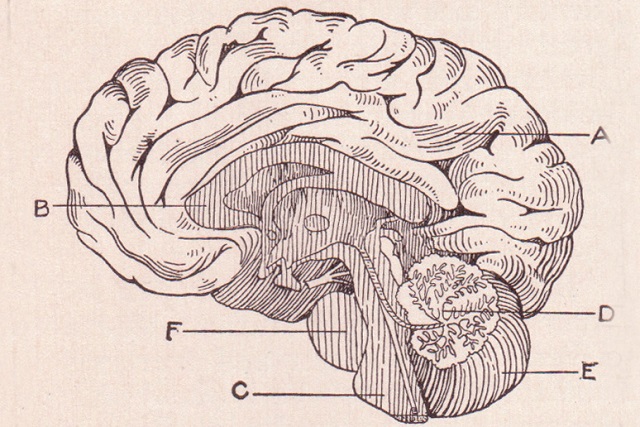5 books about the brain and consciousness
29 Oct 2016
What to read about the brain mechanisms
What to read about the structure, functioning of the brain and its capabilities? Can you trust the brain? How to interact with the mind and the brain, and how his work can be seen in the context of neuroscience? Important work in this area in the selection of recommended books.

- 1.K. Frith brain and soul. How nervous activity shapes our inner world.
This is one of the rare books in Russian, which is professional and affordable tells the story of how the mental world is arranged. The world of our sensations, feelings and perceptions. The author, a famous English neurobiologist and neuropsychologist, examining the details of the anatomical unit of the human brain, tells the story of how originate, develop and live like mental images and ideas about the real physical world. In his narration the author uses the information obtained in the most recent publications on how to change the activity of a variety of surface and deep structures of the brain at a particular behavioral action. Enclosures and landscapes of the inner worlds of man, it turns out, does not necessarily have to be copies of external reality. On the contrary, it is the full owner of the fruits of creativity of the brain - work, not divorced from reality, but only to fill the gaps in her knowledge. Our inner world, according to the author of the book, if not richer almost than the outside world, as it complements the options of possible implementations and spiritual quest.
- 2.Ramachandran VS Birth mind. Mysteries of our consciousness.
Only two or three line assigns the author describing itself of any illness or injury of a patient, and then sent to the reader with the author in a leisurely study of brain devices and sources of intelligence. Here in one patient with a missing right limb as soon as the doctor touched his cheek on the left, immediately he itched thumb, which is not. No sooner had the doctor to touch her cheek just below the former place as want to have to scratch the index finger of the same hand missing. Ramachandran, as if wondering himself, investigating the causes of this phenomenon, and the reader is suddenly notices that he now knows not only about the phenomenon, not only about its causes, but also about the very marrow device, and more about how this whole "mechanics " working.
For brain improvement use Phenotropil, Noopept, Picamilon GABA.
How we perceive the world around us and where in the process the error occur? Are there any universal criteria of artistic taste, or it depends on cultural differences and national peculiarities of the people? Why do some people with the sound of a specific tone feel a certain color? As may appear colored and numbers printed on paper by the same ink? Why such confusion modalities of sensations, synaesthesia, preserved in human evolution? What is the favorite author of the mirror neurons that are activated in the brain not only for some of their own actions, but also with a similar action of another person? Finally, and most have a philosophical question: whether a person's will by his example, flex your finger when deliberately wants to do it. It turns out that for a second before the moment when a person decides to bend the finger, the brain is all calculated and independently decided to bend the finger. So we secretly commands our brain, not his own mind! So quietly Vilayanur S. Ramachandran tells us not only about the structure and functioning of the brain, about the mysteries of the mind, but also leads to the conclusion that his favorite subject, neurology - a storehouse of philosophy.
- 3.Spitzer M. The whole truth about the brain. Popular neurology.
Demanding reader, having read a dozen pages can call this book is not very interesting. However, here you have to be a certain patience. Indeed, the book does not have the density of information flow, that aura of mystery in the descriptions of the brain and its activity, not even sophisticated theories that usually riveting attention to the scientific and popular works. But there is a leisurely account of all sorts of different stories about cases of medical practice, which has seen in my lifetime psychiatrist and neurologist, Dr. Manfred Spitzer wonderful. In the book, the author pays relatively little attention to proper medical aspects of a case, but fully discloses its deeper meaning and significance to the design of the brain point of view, the content of the mental processes and errors domestic interpretations of brain activity. It can be said that the book, Manfred - a collection of all sorts of stories that in some way shed light on the mechanisms of the brain and mind. This is a direct observation of the author, or the fruits of the random thoughts, conversations with friends. "The whole truth about the brain" - it is a very balanced, well thought out from all sides of the story about the different aspects of the human brain, which, on the one hand, it would seem, is absolutely clear from the school, on the other hand, if you think, are quite cryptic, reveals the secret life of the brain. Somewhere after reading the first third of the book it becomes clear that the unhurried pace of the presentation by the author of his story correspond to the speed of the natural perception of the subject and the only acceptable to the thoughtful reader. It becomes obvious that babies begin to adapt to the external environment, while still in the womb; chocolate, of course, has a positive effect on brain activity, a healthy sex itself controls the level of sex hormone testosterone, and not vice versa. By the end of the book the reader is surprised to find that he won not just a mass of new knowledge about the brain, but learn how to assess and treat any new information or their own observations about how the human brain works in the context of their own experiences, and when viewed from the side.
- 4.Doydzh N. Brain Plasticity. Stunning facts about how thoughts can change the structure and function of our brain.
Author of the book - an unusual person. Not only is he a doctor of medicine, a psychiatrist, psychoanalyst and professor at Columbia University in New York and the Faculty of Psychiatry of the University of Toronto - he is also a talented essayist, poet, and a great popularizer of science about the brain. His book, "Brain Plasticity" - a rare example of a combination of scientific rigor of presentation the most improbable hypotheses, medical rigor descriptions of clinical cases and dramaturgic verified feed. And all this for the sake of promotion of a brilliant idea that the brain is capable of changing its own structure and function due to the thoughts and actions of man. Norman believes Doydzh revolution understanding of the brain as the substrate of our behavior and intelligence, constantly modified according to the cognitive needs of the organism. "This revolution, in connection with the brain neuroplasticity - wrote Norman Doydzh - can not influence on our understanding of how love, sex, grief, relationships with people, education, addiction, culture, technology and psychotherapy alter our brain" . Indeed, a new understanding of the brain, the structure and the content of which is constantly being rebuilt in favor of the current needs of intelligence, can not fail to affect not only the biological and medical research, but also the human, social and natural sciences, which in one way or another deal with human nature . Bright, accessible, always intrigue Norman Doydzh says as outstanding scientists, proving the brain plasticity, and for patients whose lives have changed much for the better due to the fact that they suffered from injuries he perfected the brain so that its healthy parts started to work perfectly a new way to compensate for brain mechanisms defective. Book Norman Doydzha has undoubted charge of optimism, it gives you the belief that the mind and will of the people can not only improve the brain of a healthy person, but also to make him win any disease.
- 5.Aamodt, S., Wong S. Secrets of the brain, or Why smart people do stupid things.
Sandra Aamodt and Sam Wang is well known for his work in the study of the human brain mechanisms in health and disease. Perhaps therefore a popular science book about how the brain works, contains a minimum of excursions into the textbooks of anatomy and physiology, but is full of fascinating information and facts from the life of the brain that explain our behavior, our abilities and causes some brain diseases. The book - a kind of invitation to explore your own mind. It's called the original version of "Welcome to your brain." In fact, the reader will not be deceived. In six major sections, he discovers feelings and how they are deceptive, why do not all become geeks and whether there is a chance to remain in full mind to old age can you trust your brain as are formed, why do we need emotions and whether they are relevant to the state of happiness, what is more important, and more important: heredity or upbringing - and finally, as far as we are rational, reasonable, and how our consciousness is subject to the action of pharmacological and psychological effects? All this and much more Sandra Aamodt and Sam Wang told in an accessible and entertaining form, and most importantly, with the knowledge and enthusiasm of professionals guides, leading her first tour group. Book Sandra Aamodt and Sam Wang is useful by the fact that justifies the folly of even the most intelligent people that this is due to the appropriate structure and content of their brain.

 Cart
Cart





